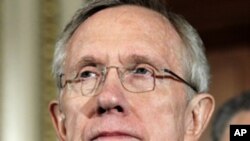In coming weeks, the U.S. Congress is widely expected to raise the federal government’s debt ceiling, thereby allowing it to borrow additional funds and service America’s $14 trillion national debt. Congress has never failed to raise the borrowing limit - to do so would be to risk default and invite financial calamity.
But few votes are more distasteful to lawmakers than going on record to authorize greater U.S. indebtedness - votes that always invite partisan sniping, grandstanding, and, this time around, hard bargaining.
Except for a brief period in the late 1990s when the United States enjoyed a budget surplus, the federal government has had to borrow more and more money to cover the cumulative indebtedness of yearly deficits. And every time the government bumps up against its borrowing limit, Congress has to step in and raise the debt ceiling.
Typically, the party in power serves as the voice of reason and responsibility, urging lawmakers to do what is necessary to keep the government afloat. Senate Majority Leader Harry Reid, the top congressional member of President Barack Obama's Democratic Party, recently put it this way:
“We have no choice," said Harry Reid. "Everybody in the world recognizes that this country cannot default on its debt. We have a credit card [bill] we have to pay.”
But, for the minority party, debt ceiling votes provide an irresistible temptation for partisan bickering.
This is what Reid had to say as minority leader in 2006, when Republicans controlled the Senate. “How can the Republican majority in this Congress explain to their constituents that trillions of dollars of new debt is good for our economy," he asked.
That year, Senate Democrats voted against raising the debt ceiling, confident that the Republican majority would provide the votes needed to increase the borrowing limit and avert a fiscal crisis. Among those casting a ‘no’ vote was then-Senator Obama, who argued that raising the debt limit amounted to a failure of economic leadership under then-President George W. Bush.
Today, President Obama sees things differently. White House spokesman Jay Carney had this to say about Mr. Obama’s 2006 vote in the Senate:
“The president regrets that vote and thinks it was a mistake," said Carney. "He realizes now that raising the debt ceiling is so important to the health of this economy and the global economy that it is not a vote you can play around with.”
Democrats are not the only ones to flip-flop on debt ceiling votes. In 2002, Republican Representative Mike Pence of Indiana spoke on the House floor before voting to raise the debt ceiling:
“I came here believing, as so many people I represent believe, that if you owe debts, [you should] pay debts," said Pence.
Today, many Republicans are refusing to commit to a debt ceiling increase, unless President Obama agrees to deep spending cuts in federal programs long-championed by Democrats.
Congressman Pence earlier this year said, “I will not support an increase in the debt ceiling without real and meaningful changes in spending."
Analysts say there is nothing new about partisanship in debt ceiling votes. Marc Goldwein is policy director of the Washington-based Committee for a Responsible Federal Budget.
“There has always been politics behind the debt ceiling," said Goldwein. "And it is always the party in power that gets stuck with the vote, and the party not in power that blames the party in power for creating deficits that got us here in the first place. That said, that is not a reason to not use the debt ceiling to focus on our debt issues. We have to raise the debt ceiling, but we also need to start thinking seriously about our long term debt situation.”
The United States bumped up against the current borrowing limit of $14.2 trillion last month. Economists say the nation risks default if the debt ceiling is not raised by August.















